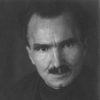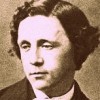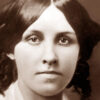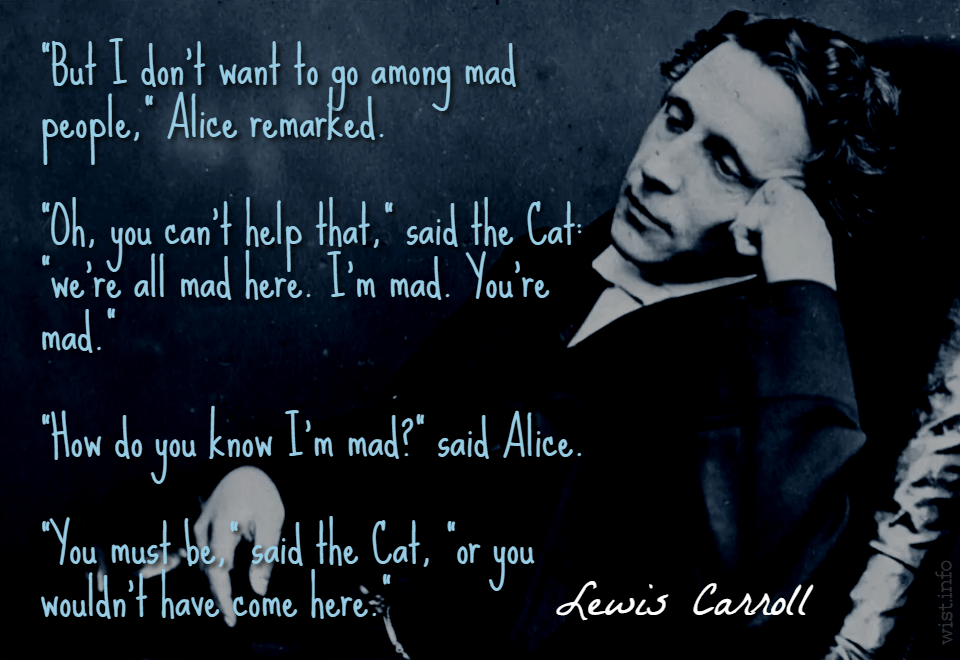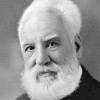No solitary miscreant, scarcely any solitary maniac, would venture on such actions and imaginations, as large communities of sane men have, in such circumstances, entertained as sound wisdom.
Thomas Carlyle (1795-1881) Scottish essayist and historian
“Signs of the Times,” Edinburgh Review No. 98, Art. 7 (1829-06)
(Source)
Quotations about:
madness
Note not all quotations have been tagged, so Search may find additional quotes on this topic.
When the whole world is running towards a cliff, he who is running in the opposite direction appears to have lost his mind.
LEAR: O, that way madness lies; let me shun that;
No more of that.William Shakespeare (1564-1616) English dramatist and poet
King Lear, Act 3, sc. 4, l. 24ff (3.4.24-25) (1606)
(Source)
Only by fleeing did we avoid
being torn to pieces by the Bacchae,
but they attacked our grazing calves and not with swords in their hands.
You could have seen one of them, apart from the others, mauling with both hands
a young heifer with swelling udders, bellowing all the while;
and other women were ripping apart mature cows, shredding them up.
You could have seen ribs or a cleft hoof
being tossed up and down. Hanging from the fir trees
the ribs and hooves dripped bloody gore.
Bulls previously aggressive and tossing their horns in rage
now tumbled to the ground, their bodies dragged down
by the myriad hands of young women.
Their garments of flesh were ripped off
faster than you could have winked your royal eyes.[ἡμεῖς μὲν οὖν φεύγοντες ἐξηλύξαμεν
βακχῶν σπαραγμόν, αἳ δὲ νεμομέναις χλόην
μόσχοις ἐπῆλθον χειρὸς ἀσιδήρου μέτα.
καὶ τὴν μὲν ἂν προσεῖδες εὔθηλον πόριν
μυκωμένην ἔχουσαν ἐν χεροῖν δίχα,
ἄλλαι δὲ δαμάλας διεφόρουν σπαράγμασιν.
εἶδες δ᾽ ἂν ἢ πλεύρ᾽ ἢ δίχηλον ἔμβασιν
ῥιπτόμεν᾽ ἄνω τε καὶ κάτω: κρεμαστὰ δὲ
ἔσταζ᾽ ὑπ᾽ ἐλάταις ἀναπεφυρμέν᾽ αἵματι.
ταῦροι δ᾽ ὑβρισταὶ κἀς κέρας θυμούμενοι
τὸ πρόσθεν ἐσφάλλοντο πρὸς γαῖαν δέμας,
μυριάσι χειρῶν ἀγόμενοι νεανίδων.
θᾶσσον δὲ διεφοροῦντο σαρκὸς ἐνδυτὰ
ἢ σὲ ξυνάψαι βλέφαρα βασιλείοις κόραις.]Euripides (485?-406? BC) Greek tragic dramatist
Bacchæ [Βάκχαι], l. 734ff [Messenger/Ἄγγελος] (405 BC) [tr. Esposito (1998)]
(Source)
Telling Pentheus of how the Bacchantes, led by his mother, Agave, slew a herd of cattle. (Source (Greek)). Alternate translations:
By hasty flight
From these infuriate Bacchanalian dames
We scap'd; but they our grazing herds invaded,
Tho' in their hands no steely weapon gleam'd:
You might have seen one seize and firmly hold
A fatted heifer, others rent the limbs
Of steers asunder; ribs and cloven hoofs
Were toss'd around, from branching pine distill'd
Morsels of flesh and intermingled gore.
The raging bulls , who menac'd with their horns,
Were in a moment stretch'd upon the ground
Assail'd by many a blooming maid: the Daughters
Of royal Cadmus from the flesh tore off
The hides, ere you could close your eyes.
[tr. Wodhull (1809)]
We fled and escaped from being torn apart by the Bacchae, but they, with unarmed hands, sprang on the heifers browsing the grass. and you might see one rending asunder a fatted lowing calf, while others tore apart cows. You might see ribs or cloven hooves tossed here and there; caught in the trees they dripped, dabbled in gore. Bulls who before were fierce, and showed their fury with their horns, stumbled to the ground, dragged down by countless young hands. The garment of flesh was torn apart faster then you could blink your royal eyes.
[tr. Buckley (1850)]
We fled amain, or by the Bacchanals
We had been torn in pieces. They, with hands
Unarmed with iron, rushed on the browsing steers.
One ye might see a young and vigorous heifer
Hold, lowing in her grasp, like prize of war.
And some were tearing asunder the young calves;
And ye might see the ribs or cloven hoofs
Hurled wildly up and down, and mangled skins
Were hanging from the ash boughs, dropping blood.
The wanton bulls, proud of their tossing horns
Of yore, fell stumbling, staggering to the ground,
Dragged down by the strong hands of thousand maidens.
And swifter were the entrails torn away
Than drop the lids over your royal eyeballs.
[tr. Milman (1865)]
In hurried flight we hardly could escape
The Bacchants' clutch. and then they wreaked their rage
Albeit unarmed, upon the browsing herds.
Here might one see the fatling heifer seized,
And lowing, torn to pieces in their hands,
While others rent the kids to fragments there.
There hurled about, the ribs and cloven hoofs
Lay scattered; others cast into the pines
The gory gobbets dripping down with blood.
The wanton bulls, striving in vain to butt,
Were thrust perforce and headlong on the ground,
Driven by the myriad force of girling hands.
More quickly they tore off the flesh than though
Could'st close thine eyelids on thy royal eyes.
[tr. Rogers (1872), l. 694ff]
Thereat we fled, to escape being torn in pieces by the Bacchantes; but they, with hands that bore no weapon of steel, attacked our cattle as they browsed. Then wouldst thou have seen Agave mastering some sleek lowing calf, while others rent the heifers limb from limb. Before thy eyes there would have been hurling of ribs and hoofs this way and that; and strips of flesh, all blood-bedabbled, dripped as they hung from the pine-branches. Wild bulls, that glared but now with rage along their horns, found themselves tripped up, dragged down to earth by countless maidens’ hands. The flesh upon their limbs was stripped therefrom quicker than thou couldst have closed thy royal eye-lids.
[tr. Coleridge (1891)]
O then we fled, and fleeing scantly 'scaped
The Bacchanals' rending grasp. Down swooped they then
Upon our pasturing kine with swordless hand.
Then hadst thou seen thy mother in her grip
Clutch a deep-uddered heifer bellowing loud:
And others rent the calves in crimson shreds.
Ribs hadst thou seen and cloven hoofs far hurled
This way and that, and flakes of flesh that hung
And dripped all blood-bedabbled 'neath the pines.
Bulls, chafing, lowering fiercely along the horn
Erewhile, were tripped and hurled unto the earth,
Dragged down by countless-clutching maiden hands.
More swiftly was the flesh that lapped their bones
Stripped, than thou couldst have closed thy kingly eyes.
[tr. Way (1898)]
Thereat, for fear they tear us, all we fled
Amazed; and on, with hand unweaponèd
They swept toward our herds that browsed the green
Hill grass. Great uddered kine then hadst thou seen
Bellowing in sword-like hands that cleave and tear,
A live steer riven asunder, and the air
Tossed with rent ribs or limbs of cloven tread,
And flesh upon the branches, and a red
Rain from the deep green pines. Yea, bulls of pride,
Horns swift to rage, were fronted and aside
Flung stumbling, by those multitudinous hands
Dragged pitilessly. And swifter were the bands
Of garbèd flesh and bone unbound withal
Than on thy royal eyes the lids may fall.
[tr. Murray (1902)]
At this we fled
and barely missed being torn to pieces by the women.
Unarmed, they swooped down, upon the herds of cattle
grazing there on the green of the meadow. And then
you could have seen a single woman with bare hands
tear a fat calf, still bellowing with fright,
in two, while others clawed the heifers to pieces.
There were ribs and cloven hooves scattered everywhere,
and scraps smeared with blood hung from the fir trees.
And bulls, their raging fury gathered in their horns,
lowered their heads to charge, then fell, stumbling
to the earth, pulled down by hordes of women
and stripped of flesh and skin more quickly, sire,
than you could blink your royal eyes.
[tr. Arrowsmith (1960)]
So we took to our heels and escaped
being torn to pieces by the bacchants; but they attacked the grazing
heifers, with hands that bore no steel.
And one you could have seen holding asunder in her hands
a tight-uddered, young, bellowing heifer;
while others were tearing full-grown cows to pieces.
You could have seen ribs, or a cloven hoof,
being hurled to and fro; and these hung
dripping under the fir trees, all mixed with blood.
Bulls that were arrogant before, with rage
in their horns, stumbled to the ground,
borne down by the countless hands of girls.
The garments of flesh were drawn apart more quickly
than you could close the lids over your royal eyes.
[tr. Kirk (1970)]
So we fled, and escaped being torn in pieces by these possessed women. But our cattle were feeding there on the fresh grass; and the Bacchae attacked them, with their bare hands. You could see Agauë take up a bellowing young heifer with full udders, and hold it by the legs with her two arms stretched wide. Others were tearing our cows limb from limb, and you could see perhaps some ribs or a cleft hoof being tossed high and low; and pieces of bloody flesh hung dripping on the pine-branches. And bulls, which one moment were savagely looking along their horns, the next were thrown bodily to the ground, dragged down by the soft hands of girls -- thousands of them; and they stripped the flesh off their bodies faster than you could wink your royal eyes.
[tr. Vellacott (1973)]
We changed roles and became the hunted,
Fleeing for sweet life. Another moment and
We would have been shredded like chaff.
Balked of their prey, the Maenads turned upon our herd.
Unarmed, they swooped down on our heifers grazing
In the meadows, nothing in their hands, nothing.
Their bare arms sufficed. They rent young, stocky
Heifers in two - you should have heard their death bellows,
Seen these frail-built creatures wrench
Full-grown cattle limb from limb, ribs, hooves
Spiral into he air, fall in torrents of blood,
Seen our dismembered livestock hang from branches
Blood spattering the leaves, seen wild bulls
With surging horns, unapproachable till now
Tripped, sprawled, full-length on the ground
Bellow in unaccustomed terror as girlish limbs
Tore them apart, flayed them living.
[tr. Soyinka (1973)]
Well, we escaped, and managed to avoid
the bacchae’s mangling; but the cattle grazing
in the grass they set upon with their bare hands:
one could be seen to take a well-uddered heifer
and pull it apart mooing in her hands;
others carried off calves and mangled them;
you might have seen a rib or cloven hoof
hurled helter-skelter; things hung
and dripped beneath the firs, befouled with blood;
bulls, violent and raging in their horns
before, were stumbling their forms upon the earth,
driven by thousands of maidenly hands,
that swifter stripped the garment of their flesh
than you could close your lids on kingly eyes.
[tr. Neuburg (1988)]
At this we fled
and barely escaped being torn to pieces
by these God-struck maenads.
But our cattle --
our herds grazing on the grassy slopes -- oh!
They fell upon them with their naked hands.
You could see a woman sink her nails into a cow,
with its udders full, and left it, bellowing, high above her head.
Others dragged young heifers, ripping them apart.
Everywhere you looked,
ribs and cloven hooves
were flying through the air.
And from the pine branches
dangled lumps of flesh that dripped with blood. Majestic bulls
one minute aiming their horns with all their furious pride,
the next were stumbling to the ground,
overwhelmed by the swarming hands of girls,
their bones stripped clean of all their flesh,
faster than you could blink your royal eyes.
[tr. Cacoyannis (1982)]
Then we fled to escape being torn
To pieces by them. Barehanded,
They attacked cattle grazing grass.
You could see one woman drawing
Apart a heifer, fat and bellowing,
Others tore and mangled grown heifers.
You could see ribs or a cloven hoof
Thrown up and down and, suspended
From fir trees, drip defiled, with blood.
Arrogant bulls too, rage once filling
Their horns, were tripped bodily to the ground
Ravaged by hundreds of young hands,
And were stripped of their garment of flesh
Before you could blink your royal eyes.
[tr. Blessington (1993)]
So we were the ones who ran away, to escape
being torn apart by the Bacchae. And they attacked
our livestock as they were grazing on new grass.
No sharp weapons, but you'd have seen one woman
tear apart a young cow with her bare hands --
it was bellowing, its udder was swollen with milk. Others
ripped grown cows to pieces. You'd see ribs and feet
hurled every which way, hooves flying, pieces hanging
in the pine trees, smeared with blood and ripping.
Bulls in all their pride stumbled headlong:
They once had rage tossing on their long horns;
now more hands than you can count pull
them down -- young girls' hands. And strip off the flesh
that covered them, faster than a king could wink one eye.
[tr. Woodruff (1999)]
We ran away from them -- to escape being torn
Apart by the maenads. But with their bare hands,
Not with weapons of iron, then they began
To attack the grazing herds. You would have seen
One woman by herself with just her hands
Pulling in two a big young heifer that
Had swelling udders and was bellowing,
And meanwhile others were dismembering
The full-grown cattle, flaying them to shreds.
You would have seen the ribs and hooves hurled up,
Thrown down, flying through the air, and pieces
Hanging from the trees, still dripping blood.
Even arrogant bulls were stumbling, forced
To the ground, the anger in their horns outweighed
By the countless hands of girls -- their rags of flesh
Were torn from them much faster than you could
Have blinked your royal eyes.
[tr. Gibbons/Segal (2000), l. 842ff]
We ran away and thereby escaped being torn to pieces by the bacchants. But they, with n iron weapons in their hands, attacked some grazing cattle. You could have seen one of the women tearing asunder a bellowing fatted calf with her hands, while others tore heifers to pieces. You could have seen their flanks and cloven hooves hurled this way and that: pieces, drenched with blood, hung dripping from the fir trees. Bulls that till then were violent, with anger in their horns, were thrown to earth, dragged by countless female hands: their covering of flesh was torn in pieces faster than your majesty could blink your royal eyes.
[tr. Kovacs (2002)]
We turned and ran for it, for we have heard
How the Bacchai, when their god is with them,
Will eat raw the flesh from still-living beasts.
We escaped but they found our grazing herds.
They slaughtered them with nothing but their hands.
One dragged a calf form its own mother's teat
And tore it, as it bellowed, clean in two,
While others pulled apart whole heifers.
The woods soon seemed a bloody abattoir.
Even one proud-horned bull was dragged to earth,
His flesh, by fingernails, scratched from his bones
And the scrag ends hurled high into the trees.
All done by the hands of girls and women,
And quicker than a wink from a royal eye.
[tr. Teevan (2002)]
Then seeing we had run out of reach, they fell in fury upon our flocks, tearing the heifers apart with bear hands. Great, large beasts ripped into little shreds of blood and gristle faster than the lids can fall over your royal eyes.
[tr. Rao/Wolf (2004)]
We just managed to run away and escape the slaughter but they threw themselves, with no spear nor sword, at the calves that were quietly grazing nearby. One of those women tore a poor, tiny calf away from its mother’s udder and others ripped calves to bloody pieces with their bare hands and then they began eating them raw. My Lord, you could see bits of flesh strewn all around the place. Whole sides of animals, legs, other chunks of animal flesh hanging from the fir trees, dripping blood. Huge bulls, my Lord which only a few minutes earlier stood tall and proud, the sort that if one got them angry they’d tear everything apart with their massive horns, well, now they dropped their bodies to the ground and straightaway countless girls dragged them about with their bare hands and ... and by the time you blinked your royal eye, my Lord, they’d have the skin torn off those massive carcasses of them bulls.
[tr. Theodoridis (2005)]
And so we ran away in fear and avoided being torn to
bits and eaten like deer by the bacchants; but they
attacked our cattle, barehanded, as they grazed
in the field, and you could see one grab and stretch
the legs of a young, pink-uddered calf, bellowing, as other
Maenads pulled and tore a full-grown heifer apart.
And you'd have seen ribs or cloven hooves thrown
up and down as they dripped, hanging from
fir tree branches, cover'd in blood.
The proud bulls, which moments before had been fully
ready to charge, dropped their body down to earth,
brought down by countless maidens' hands as they
stripped the poor beast's flesh right off like clothes
in the time it'd take you to blink your highness' eye.
[tr. Valerie (2005)]
We ran off, and so escaped being torn apart. But then those Bacchic women, all unarmed, went at the heifers browsing on the turf, using their bear hands. You should have seen one ripping a fat, young, lowing calf apart -- others tearing cows in pieces with their hands. You could've seen ribs and cloven hooves tossed everywhere -- some hung up in branches dripping blood and gore. And bulls, proud beasts till then, with angry horns, collapsed there on the ground, dragged down by the hands of a thousand girls. Hides covering their bodies were stripped off faster than you could wink your royal eye.
[tr. Johnston (2008)]
We fled.
They would have torn us to pieces, those Bacchae.
Instead, they turned -- bare-handed --
on our herd of grazing cattle.
A single woman pulled a mewling calf in two,
while others clawed apart a full-grown heifer.
There were spread ribs and broken hooves
flung everywhere,
and pieces of flesh hung
dripping from the trees.
Great bulls, their power and fury tightening in their horns,
lowered their heads to charge
but were wrestled to the ground
by countless female hands and flayed alive --
faster, sire, than a blink of your royal eyes.
[tr. Robertson (2014)]
We ran. And just avoided a shredding by the Bacchae.
And since they couldn’t have us ...
They got the grazing cows instead. Attacked them with nothing but their hands.
You’d have seen them tearing a fat calf in two, screaming in their grasp. Look another way and there they were, rending pieces off a heifer.
You would have seen ribs and cloven hooves thrown all over the place, blood-drenched ribbons hanging from the trees, still dripping. Proud bulls, tossing their horns in defiant rage, were driven to the ground, torn down by more women’s hands than I could count. Their hides were ripped from the meat in the blink of an eye, even your kingly eyes.
[tr. Pauly (2019)]
We fled and escaped being torn apart by the Bacchants, but they, unarmed, sprang on the heifers browsing the grass. You could have seen one rending asunder a fatted lowing calf, while others tore apart cows. You could have seen ribs or cloven hooves tossed all about; caught in the trees they dripped, dabbled in gore. Bulls who formerly with hubris showed their fury with their horns had their bodies cut to the ground, dragged down by the countless hands of young girls. The garment of flesh was torn apart faster then you could blink your royal eyes.
[tr. Buckley/Sens/Nagy (2020)]
War is always the same. It is young men dying in the fullness of their promise. It is trying to kill a man that you do not know enough to hate. Therefore, to know war, is to know that there is still madness in the world.
Lyndon B. Johnson (1908-1973) American politician, educator, US President (1963-69)
State of the Union address (1966-01-12)
(Source)
When a sensible man
has a good cause to defend, to be eloquent
is no great feat. Your tongue is so nimble
one might think you had some sense, but your words
contain none at all. The powerful man
who matches insolence with glibness is worst than a fool.
He is a public danger![ὅταν λάβῃ τις τῶν λόγων ἀνὴρ σοφὸς
καλὰς ἀφορμάς, οὐ μέγ᾽ ἔργον εὖ λέγειν:
σὺ δ᾽ εὔτροχον μὲν γλῶσσαν ὡς φρονῶν ἔχεις,
ἐν τοῖς λόγοισι δ᾽ οὐκ ἔνεισί σοι φρένες.
θράσει δὲ δυνατὸς καὶ λέγειν οἷός τ᾽ ἀνὴρ
κακὸς πολίτης γίγνεται νοῦν οὐκ ἔχων.]Euripides (485?-406? BC) Greek tragic dramatist
Bacchæ [Βάκχαι], l. 266ff [Tiresias/Τειρεσίας] (405 BC) [tr. Cacoyannis (1982)]
(Source)
To Pentheus. (Source (Greek)). Alternate translations:
When the wise man hath found a specious topic
On which to argue, he with ease may frame
An eloquent harangue. Your tongue indeed
Is voluble like theirs who reason well,
But in your language no discretion reigns.
He who possesses courage, sovereign power. A
And fluency of speech, if not endued
With wisdom, is an evil citizen.
[tr. Wodhull (1809)]
Whenever a wise man takes a good occasion for his speech, it is not a great task to speak well. You have a rapid tongue as though you were sensible, but there is no sense in your words. A man powerful in his boldness, one capable of speaking well, becomes a bad citizen in his lack of sense.
[tr. Buckley (1850)]
'Tis easy to be eloquent, for him
That's skilled in speech, and hath a stirring theme.
Thou hast the flowing tongue of a wise man,
But there's no wisdom in thy fluent words;
For the bold demagogue, powerful in speech,
Is but a dangerous citizen lacking sense.
[tr. Milman (1865)]
When wise men reason from sound principles,
They find it no hard task to reason well.
Thy tongue’s as fluent as the wisest man’s,
And yet thy argument is void of sense.
[tr. Rogers (1872), l. 253ff]
Whenso a man of wisdom finds a good topic for argument, it is no difficult matter to speak well; but thou, though possessing a glib tongue as if endowed with sense, art yet devoid thereof in all thou sayest. A headstrong man, if he have influence and a capacity for speaking, makes a bad citizen because he lacks sense.
[tr. Coleridge (1891)]
Whene'er a wise man finds a noble theme
For speech, 'tis easy to be eloquent.
Thou -- roundly runs thy tongue, as thou wert wise;
But in these words of thine sense is there none.
The rash man, armed with power and ready of speech,
Is a bad citizen, as void of sense.
[tr. Way (1898)]
Good words, my son, come easily, when he
That speaks is wise, and speaks but for the right.
Else come they never! Swift are thine, and bright
As though with thought, yet have no thought at all.
[tr. Murray (1902)]
Give a wise man an honest brief to plead
and his eloquence is no remarkable achievement.
But you are glib; your phrases come rolling out
smoothly on the tongue, as though your words were wise
instead of foolish. The man whose glibness flows
from his conceit of speech declares the thing he is:
a worthless and a stupid citizen.
[tr. Arrowsmith (1960)]
When a wise man chooses a sane basis
for his arguments, it is no great task to speak well;
but you have a glib tongue, as though in your right mind,
yet in your words there is no real sense.
The man who is influential by sheer aggressiveness, and knows how to speak,
proves to be a bad citizen -- for he lacks sanity.
[tr. Kirk (1970)]
When a clever man has a plausible theme to argue, to be eloquent is no great feat. But though you seem, by your glib tongue, to be intelligent, yet your words are foolish. Power and eloquence in a headstrong man can only lead to folly; and such a man is a danger to the state.
[tr. Vellacott (1973)]
Oh it's so easy for some to make speeches.
They pick a soft target and the words rush out.
Now listen you. Your tongue runs loose
Makes a plausible sound and might
Almost be taken for sense. But you have none.
Your glibness flows from sheer conceit.
Arrogant, over-confident and a gift -- yes --
A gift for phrases, and that makes you a great
Danger to your fellow men.
[tr. Soyinka (1973)]
A man who takes a fair basis for speaking,
a wise man, has no trouble speaking well;
you have a well-wheeled tongue, as though thinking,
but in the words you speak there is no thought.
A man empowered by daring and able to speak
becomes a bad citizen, devoid of reason.
[tr. Neuburg (1988)]
When some wise man has a fair cause
o present, to speak well is easy.
You have a tongue, glib like thought,
But no sense lies in your words.
The man that rashness prompts to speak
Proves an evil citizen and senseless.
[tr. Blessington (1993)]
Whenever a wise man sets out to argue an honest case
it's no great undertaking to argue well.
Your tongue runs smooth like a wheel, as if you were a man of reason,
but your words reveal no reason.
If he behaves recklessly, an able and articulate man
turns out to be a bad citizen because he lacks good sense.
[tr. Esposito (1998)]
When a prudent speaker takes up a noble cause, he’ll have no great trouble to speak well. You, on the other hand, have a tongue that runs on smoothly and sounds intelligent. But what it says is brainless. True, boldness can help a man speak powerfully, but he’ll turn out bad for the city because he'll have no sense.
[tr. Woodruff (1999)]
It's no great task to speak well, when a man's
Intelligent and starts well with good words.
But you: your tongue runs smoothly, as if you had
Some understanding. Yet your words are senseless.
A man like you, whose strength is that he's bold,
Who's good at speaking, too, can only make
a bad citizen -- for he lacks good sense.
[tr. Gibbons/Segal (2000)]
When a wise man has a good case to argue, eloquence is easy. As for you, though you think yourself clever and have a ready tongue, there is no intelligence in what you say. [A man whose power lies in brashness and who is a fluent speaker becomes a bad citizen if he lacks sense.]
[tr. Kovacs (2002)]
As for you -- your tongue is quick and your talk runs as if you had wit, but there is none in what you say. A man who confuses impudence with strength is a fool.
[tr. Rao/Wolf (2004)]
When a wise man is given the opportunity to speak, it’s no big problem to speak the truth. You, Pentheus, you are, of course an articulate man, or so you think, but your words lack logic. Audacity, strength and eloquence all on their own, make for a bad citizen -- a stupid one.
[tr. Theodoridis (2005)]
When a man who's wise in words starts his speech
from a proper course, it is no great task to speak well;
and you, spinning a tricky tongue, seem to make sense,
but there is no sense in what you are saying;
and a man who is bold, powerful and a clever speaker
makes for a bad citizen, if he has not the proper mind.
[tr. Valerie (2005)]
When a man of wisdom has good occasion to speak out and takes the opportunity, it's not that hard to give an excellent speech. You've got a quick tongue and seem intelligent, but your words don't make any sense at all. A fluent orator whose power comes from self-assurance and from nothing else makes a bad citizen, for he lacks sense.
[tr. Johnston (2008)]
When a wise man has an honest case to plead, then eloquence, I find, is very easy to achieve. You think yourself clever, and have a smooth tongue, but, your words are foolish. The man whose power lies in his conceit does not make a good citizen.
[tr. Robertson (2014)]
It’s no great task for a wise man to speak well when the time comes, if he picks it carefully. You hold yourself as if you’re one of these ready-tongued individuals. You’re not. Your words lack sense behind them. Even the boldest speaker fails as a citizen when his words lack sense.
[tr. Pauly (2019)]
Wisdom from the wise surprises no one. But your clever tongue makes yuou seem wise when you have no understanding. Rash eloquence is society's disaster.
[tr. Behr/Foster (2019)]
Whenever a sophos man takes a good occasion for his speech, it is not a great task to speak well. You have a fluent tongue as though you are sensible, but there is no sense in your words. A bold and powerful man, one capable of speaking well, becomes a kakos citizen if he lacks sense.
[tr. Buckley/Sens/Nagy (2020)]
Cleverness is not wisdom,
nor is thinking thoughts that are not mortal.
Life is short; this being so,
who would pursue great things
and not bear with what is at hand? These
are the ways of madmen and
men of evil counsel, at least
in my judgment.[τὸ σοφὸν δ’ οὐ σοφία,
τό τε μὴ θνατὰ φρονεῖν
βραχὺς αἰών· ἐπὶ τούτωι
δὲ τίς ἂν μεγάλα διώκων
τὰ παρόντ’ οὐχὶ φέροι; μαι
νομένων οἵδε τρόποι καὶ
κακοβούλων παρ’ ἔμοιγε φωτῶν.]Euripides (485?-406? BC) Greek tragic dramatist
Bacchæ [Βάκχαι], l. 395ff (Stasimon 1, Antiphon/Antistrophe 1) [Chorus/Χορός] (405 BC) [tr. Kirk (1970)]
(Source)
The chorus of Bacchantes is playing with the similarly-rooted sophon (cleverness) and sophia (wisdom). (Source (Greek)). Alternate translation:
That science which beyond the scope
Of frail humanity aspires.
Haunts not the bosom of the Sage.
Short is life, and they who follow
Ambition's splendid treacherous lure
Taste not the blessings of the present hour:
I deem their conduct frantic and unwise.
[tr. Wodhull (1809)]
But cleverness is not wisdom, nor is thinking on things unfit for mortals. Life is short, and on this account the one who pursues great things does not achieve that which is present. In my opinion, these are the ways of mad and ill-advised men.
[tr. Buckley (1850)]
Beyond the range of mortal eyes
'Tis not wisdom to be wise.
Life is brief, the present clasp,
Nor after some bright future grasp.
Such were the wisdom, as I ween,
Only of frantic and ill-counseled men.
[tr. Milman (1865)]
That wisdom is not wise Which aims beyond man’s power.
Short is our life; to grasp at much is but to lose the present good, --
And this to me seems like the deed of frenzied and of foolish men.
[tr. Rogers (1872), l. 378ff]
Ah, not with knowledge is Wisdom bought;
And the spirit that soareth too high for mortals
Shall see few days: whosoever hath caught
At the things too great for a man's attaining,
Even blessings assured shall he lose in the gaining.
Such paths as this, meseemeth, be sought
Of the witless folly that roves distraught.
[tr. Way (1898)]
But the world's Wise are not wise,
Claiming more than mortal may.
Life is such a little thing;
Lo, their present is departed,
And the dreams to which they cling
Come not. Mad imagining
Theirs, I ween, and empty-hearted!
[tr. Murray (1902)]
Sophistry is not wisdom, and to indulge in thoughts beyond man’s ken is to shorten life; and if a man on such poor terms should aim too high, he may miss the pleasures in his reach. These, to my mind, are the ways of madmen and idiots.
[tr. Coleridge (1907)]
And what passes for wisdom is not;
unwise are those who aspire,
who outrange the limits of man.
Briefly, we live. Briefly,
then die. Wherefore, I say,
he who hunts a glory, he who tracks
some boundless, superhuman dream,
may lose his harvest here and now
and garner death. Such men are mad,
their counsels evil.
[tr. Arrowsmith (1960)]
To know much is not to be wise.
Pride more than mortal hastens life to its end;
And they who in pride pretend
Beyond man's limit, will lose what lay
Close to their hand and sure.
I count it madness, and know no cure can mend
The evil man and his evil way.
[tr. Vellacott (1973)]
Wisdom is not what is wise,
nor to think non-mortal thoughts.
Life is fleeting; can it be, then, that one seeks after what is greater,
not accepting circumstance?
These are the manners of a madman and, to me, of evil counsel'd persons.
[tr. Neuburg (1988)]
A knowing mind that ignores its own limits
has a very short span. And the man
who aims too high
never reaps what lies within his grasp.
Such is the folly --
and I know none worse --
of perversely ambitious, fanatical men.
[tr. Cacoyannis (1982)]
But shallow wisdom is untrue.
To think beyond this life
Cuts short our life. He who
Pursues the great, forfeits
What lies at hand. Such temperaments
According to my thought, belong
To madmen and the ill-advised.
[tr. Blessington (1993)]
So cleverness is not wisdom
nor is it wise to think thoughts unfit for mortals.
Life is short. Given such brevity
who would pursue ambitious ends
And lose what lies at hand?
These, in my opinion at least,
are the ways of madmen and evil counsellors.
[tr. Esposito (1998)]
Wisdom? It's not wise
to lift our thoughts too high;
we are human, and our time is short.
A man who aims at greatness
will not live to own what he has now.
That, I believe, is the belief of men
whose judgment is foul.
They are insane.
[tr. Woodruff (1999)]
Intellect is not wisdom.
And to think in a manner
not right for mortals means
Life will be short. Who
Would pursue great things
If doing so meant losing what
Is already his?
That is the way, as I see it,
And bad counsel, of madmen.
[tr. Gibbons/Segal (2000), l. 469ff]
Cleverness is not wisdom
nor is it wise to think thoughts not mortal.
Our life is short: this being so,
a man who pursues great things
may miss what lies at hand. To live thus
is to be, in my judgment
a madman and a fool.
[tr. Kovacs (2002)]
The wise are not wise if they don’t consider a human’s lot.
Life is short.
He who constantly pursues great achievements in this life, won’t have time to enjoy those he already has achieved.
So far as I can tell, these are the doings of madmen and evil minds.
[tr. Theodoridis (2005)]
Cleverness is not wisdom;
Thinking heavenly
Thoughts, short life; in that case,
Who, in hunting greater things,
Would not be content with present fortune?
These are ways of men insane, with-
out understanding, so it seems to me.
[tr. Valerie (2005)]
But being clever isn't wisdom.
And thinking deeply about things
isn't suitable for mortal men.
Our life is brief -- that's why
the man who chases greatness
fails to grasp what's near at hand.
That's what madmen do,
men who've lost their wits.
That's what I believe.
[tr. Johnston (2008), l. 497ff]
Cleverness is not wisdom,
that over-reaching mortals
simply shorten their lives.
Life is brief enough as it is,
so hold it all to hand.
Wild ambition is a kind of madness:
stretch too hard for the summit
and you will fail and fall
and plummet back to land.
[tr. Robertson (2014)]
Cleverness is not wisdom,
and neither is reaching beyond thoughts meant for mortals.
Our lives are short.
Spend all your time reaching
and you miss what’s in front of you.
This is the madman’s way.
Or at least the ill-counseled.
But that’s just my opinion.
[tr. Pauly (2019)]
Cleverness is not wisdom, and those who'd seem wise as the gods -- their live will be short. Those who seek greatness will not see the snake at their feet. Mad ways set all on the road to disaster.
[tr. Behr/Foster (2019)]
It is not wisdom [sophiā] to be overly sophos, and to think things unbefitting mortal men. Life is short, and in it he who pursues great things does not achieve that which is present. In my opinion, these are the ways of mad and ill-counseling men.
[tr. Buckley/Sens/Nagy (2020)]
Wisdom is not wit;
Nor is thinking thoughts which belong not to mortals.
Life is brief. And because of this
Whoever seeks out great accomplishments
May not grasp the things at hand.
These are the ways of madmen
And wicked fools, I think.
[tr. @sentantiq (2021)]
I was in love, and love makes all men frantic.
[ἤρων τὸ μαίνεσθαι δ᾽ ἄρ᾽ ἦν ἔρως βροτοῖς.]
Euripides (485?-406? BC) Greek tragic dramatist
Antigone [Ἀντιγόνη], frag. 161 (TGF, Kannicht) [Haemon?] (c. 420-406 BC) [tr. Wodhall (1809)]
(Source)
Barnes frag. 18, Musgrave frag. 7. (Source (Greek)). Alternate translation:
I was in love; and love, it turns out, is madness for mortals.
[tr. Karamanou]
I was [they were?] in love: and that showed that love is madness for mortals.
[tr. Valtadorou (2020)]
Those unfortunate enough to be dragged before one of the old Heterodynes were usually subjected to a version of what we today would call “Good Cop, Bad Cop.” However, considering the personalities involved, a more correct label would be “Bad Cop, Insanely Evil Cop.” This was never a fun experience, especially when both sides were played by different personalities manifesting within the same body — and neither of them were actually playing.
Phil Foglio (b. 1956) American writer, cartoonist
Agatha H and the Voice of the Castle (2014) [with Kaja Foglio]
(Source)
I think one must continue the political struggle, just as a doctor must try to save the life of a patient who is probably going to die. But I do suggest that we shall get nowhere unless we start by recognizing that political behaviour is largely non-rational, that the world is suffering from some kind of mental disease which must be diagnosed before it can be cured.
George Orwell (1903-1950) English writer [pseud. of Eric Arthur Blair]
“As I Please” column, Tribune (1946-11-29)
(Source)
Variant: "Politics is mostly non-rational; the world is suffering from some kind of mental disorder which must be diagnosed before it can be cured."
And what is an authentic lunatic? He is a man who has preferred to become what is socially understood as mad rather than forfeit a certain superior idea of human honor. In its asylums, society has managed to strangle all those it has wished to rid itself of or defend itself from, because they refused to make themselves accomplices to various flagrant dishonesties. For a lunatic is also a man whom society has not wished to listen to, and whom it is determined to prevent from uttering unbearable truths.
Antonin Artaud (1896-1948) French playwright, actor, director
Van Gogh, the Man Suicided by Society [Le Suicidé de la Société] (1947) [tr. Watson]
(Source)
Alternate translation:
And what is an authentic madman? It is a man who preferred to become mad, in the socially accepted sense of the word, rather than forfeit a certain superior idea of human honor. So society has strangled in its asylums all those it wanted to get rid of or protect itself from, because they refused to become its accomplices in certain great nastinesses. For a madman is also a man whom society did not want to hear and whom it wanted to prevent from uttering certain intolerable truths.
No one has ever written, painted, sculpted, modeled, built, or invented except literally to get out of hell.
Antonin Artaud (1896-1948) French playwright, actor, director
Van Gogh, the Man Suicided by Society [Le Suicidé de la Société] (1947) [tr. Watson]
(Source)
In battle the victory goes to Love;
Prizes and properties fall to Love.
Love dallies the night
On a girl’s soft cheeks,
Ranges across the sea,
Lodges in wild meadows.
O Love, no one can hide from you:
You take gods who live forever,
You take humans who die in a day,
And they take you and go mad.[Ἔρως ἀνίκατε μάχαν, Ἔρως, ὃς ἐν κτήμασι πίπτεις,
ὃς ἐν μαλακαῖς παρειαῖς νεάνιδος ἐννυχεύεις,
φοιτᾷς δ᾽ ὑπερπόντιος ἔν τ᾽ ἀγρονόμοις αὐλαῖς:
καί σ᾽ οὔτ᾽ ἀθανάτων φύξιμος οὐδεὶς
οὔθ᾽ ἁμερίων σέ γ᾽ ἀνθρώπων. ὁ δ᾽ ἔχων μέμηνεν.]Sophocles (496-406 BC) Greek tragic playwright
Antigone, l. 781ff [Chorus] (441 BC) [tr. Woodruff (2001)]
(Source)
Original Greek. Alternate translations:
Love! in the fight invincible:
Love! whose attacks at once enslave:
Who on the young maid's delicate cheeks thy nightly vigils keepest:
Who roamest o'er the main and mid the rustic cots!
None can escape thee, -- neither Gods immortal,
Nor men whose lives are fleeting as the day:
He raves whom thou possessest.
[tr. Donaldson (1848)]
Love resistless in fight, all yield at a glance of thine eye,
Love who pillowed all night on a maiden's cheek dost lie,
Over the upland holds. Shall mortals not yield to thee?
Mad are thy subjects all.
[tr. Campbell (1873)]
Love, never foiled in fight!
1 Warrior Love, that on Wealth workest havoc!
Love, who in ambush of young maid's soft cheek
All night keep'st watch!--Thou roamest over seas.
In lonely forest homes thou harbourest.
Who may avoid thee? None!
Mortal, Immortal,
All are o'erthrown by thee, all feel thy frenzy.
[tr. Storr (1859)]
Love, the unconquered in battle, Love, you who descend upon riches, and watch the night through on a girl's soft cheek, you roam over the sea and among the homes of men in the wilds. Neither can any immortal escape you, nor any man whose life lasts for a day. He who has known you is driven to madness.
[tr. Jebb (1891)]
Love, unconquered in the fight, Love, who makest havoc of wealth, who keepest thy vigil on the soft cheek of a maiden; thou roamest over the sea, and among the homes of dwellers in the wilds; no immortal can escape thee, nor any among men whose life is for a day; and he to whom thou hast come is mad.
[tr. Jebb (1917)]
Love, unconquerable
Waster of rich men, keeper
Of warm lights and all-night vigil
In the soft face of a girl:
Sea-wanderer, forest-visitor!
Even the pure Immortals cannot escape you,
And mortal man, in his one day’s dusk,
Trembles before your glory.
[tr. Fitts/Fitzgerald (1939)]
Where is the equal of Love?
Where is the battle he cannot win,
The power he cannot outmatch?
In the farthest corners of earth, in the midst of the sea,
He is there; he is here
In the bloom of a fair face
Lying in wait;
And the grip of his madness
Spares not god or man.
[tr. Watling (1947), l. 675ff]
Love unconquered in fight, love who falls on our havings.
You rest in the bloom of a girl's unwithered face.
You cross the sea, you are known in the wildest lairs.
Not the immortal gods can fly,
nor men of a day. Who has you within him is mad.
[tr. Wyckoff (1954)]
Invincible, implacable Love,
O Love, that makes havoc of all wealth;
That peacefully keeps his night-watch
On tender cheek of a maiden:
The Sea is no barrier, nor
Mountainous waste to Love's flight; for
No one can escape Love's domination,
Man, no, nor immortal god.
Love's Prey is possessed by madness.
[tr. Kitto (1962)]
Love, never conquered in battle
Love the plunderer laying waste the rich!
Love standing the night-watch
guarding a girl's soft cheek,
you range the seas, the shepherds' steadings off in the wilds --
not even the deathless gods can flee your onset,
nothing human born for a day --
whoever feels your grip is driven mad.
[tr. Fagles (1982), l. 879ff]
Eros, undefeated in battle,
Eros, who falls upon possessions,
who, in the soft cheeks of a young girl,
stays the night vigil,
who traverses over seas
and among pastoral dwellings,
you none of the immortals can escape,
none of the day-long mortals, and
he who has you is maddened.
[tr. Tyrell/Bennett (2002)]
Love! You are beyond wars, beyond any place you fall!
You make nests out of the soft cheeks of young girls for your slumber
and you hover over the oceans and distant lands
and no immortal god, nor mortal man with his measured days escapes you!
And then, you catch and your catch becomes insane!
[tr. Theodoridis (2004)]
O Eros, the conqueror in every fight,
Eros, who squanders all men’s wealth,
who sleeps at night on girls’ soft cheeks,
and roams across the ocean seas
and through the shepherd’s hut --
no immortal god escapes from you,
nor any man, who lives but for a day.
And the one whom you possess goes mad.
[tr. Johnston (2005), l. 894]
Love, unconquered in battle, Love, who attacks wealth, who sleeps on a young girl's soft cheek and wanders beyond the sea and in the wilderness: There is no escape from you for immortals or men who live but for a day; he who has you is mad. [tr. Thomas (2005)]
I can calculate the movement of the stars, but not the madness of the people.
Isaac Newton (1642-1727) English physicist and mathematician
(Attributed)
(Source)
Supposedly after the ruinous stock price collapse of the "South Sea Bubble" in 1720, in which Newton lost £20,000.
The earliest mention of this is found in Joseph Spence, Second Memorandum Book (1756), collected in Joseph Spence (ed. Samuel Weller Singer), Anecdotes, Observations, and Characters, of Books and Men (1820). There a Lord Radnor is quoted as saying: "When Sir Isaac Newton was asked about the continuance of the rising of South Sea stock? — He answered, 'that he could not calculate the madness of the people.'" (Note that this supposedly takes place before the bubble bursts.)
Variants:
- I can calculate the motions of erratic bodies, but not the madness of a multitude. ["Mammon and the Money Market," The Church of England Quarterly Review (1850)]
- I can calculate the motions of the heavenly bodies, but not the madness of people.
- I can calculate the motions of heavenly bodies but not the madness of men.
- I can calculate the movement of stars, but not the madness of men.
What inconceivable madness! For it is not enough to call an opinion “foolishness” when it is utterly devoid of reason.
[O delirationem incredibilem! non enim omnis error stultitia dicenda est.]
Marcus Tullius Cicero (106-43 BC) Roman orator, statesman, philosopher
De Divinatione [On Divination], Book 2, ch. 43 (2.43) / sec. 90 (44 BC) [tr. Falconer (1923)]
(Source)
ONLY THE MADMAN IS ABSOLUTELY SURE.
Robert Anton Wilson (1932-2007) American author, futurist self-described "agnostic mystic" [pen name of Robert Edward Wilson]
The Eye in the Pyramid (1975) [with Robert Shea]
(Source)
A person needs a little madness, or else they never dare cut the rope and be free.
Nikos Kazantzakis (1883-1957) Greek writer and philosopher
Zorba the Greek (1946)
Adapted in the 1964 screenplay by Mihalis Kakogiannis as:ZORBA: Boss, I like you too much not to say it. You've got everything except one thing: madness! A man needs a little madness, or else.
BASIL: Or else?
ZORBA: Or else, he never dares cut the rope and be free.
Almost no one dances sober, unless he is insane.
[Nemo enim fere saltat sobrius, nisi forte insanit, neque in solitudine neque in convivio moderato atque honesto.]
Marcus Tullius Cicero (106-43 BC) Roman orator, statesman, philosopher
Pro Murena, ch. 6, sec. 13 (63 BC)
(Source)
More completely, "For no man, one may almost say, ever dances when sober, unless perhaps he be a madman, nor in solitude, nor in a moderate and sober party." [tr. Yonge].
Often shortened to "Nemo saltat sobrius" ("Nobody dances sober"). Also attributed to H. P. Lovecraft.
In context, Cicero is disputing accusations that L. Murena was dancing because there are no reports that Murena was drinking and carousing beforehand.
You’re mad, bonkers, off your head … but I’ll tell you a secret … all of the best people are.
Lewis Carroll (1832-1898) English writer and mathematician [pseud. of Rev. Charles Lutwidge Dodgson]
(Spurious)
This is attributed on many pages as a quote from Carroll's Alice in Wonderland. No such quote exists in the book, and the word "bonkers" does not appear until the 1940s. This appears to be a paraphrase of lines from the 2010 Tim Burton adaptation of Carroll's work (screenplay by Linda Woolverton):
HATTER: Have I gone mad?
ALICE: [checking his temperature] I'm afraid so. You're entirely bonkers. But I'll tell you a secret. All the best people are.
But he who knows what insanity is, is sane; whereas insanity can no more be sensible of its own existence, than blindness can see itself.
[Sanus est, qui scit quid sit insania, quippe insania scire se non potest, non magis quam caecitas se videre.]
Apuleius (AD c. 124 - c. 170) Numidian Roman writer, philosopher, rhetorician [Lucius Apuleius Madaurensis]
Apologia; or, A Discourse on Magic [Apologia; seu, Pro Se de Magia], ch. 80 [tr. Bohn’s (1853)]
(Source)
Alt. trans.: "He who knows what madness is, is ipso facto sane. For madness cannot know itself any more than blindness can see itself." [tr. Butler (1909)]
As soon as people have power they go crooked and sometimes dotty as well, because the possession of power lifts them into a region where normal honesty never pays.
E. M. Forster (1879-1970) English novelist, essayist, critic, librettist [Edward Morgan Forster]
“What I Believe,” The Nation (16 Jul 1938)
(Source)
See Lord Acton.
She is too fond of books, and it has turned her brain.
O’Brien knew everything. A thousand times better than Winston, he knew what the world was really like, in what degradation the mass of human beings lived and by what lies and barbarities the Party kept them there. He had understood it all, weighed it all, and it made no difference: all was justified by the ultimate purpose. What can you do, thought Winston, against the lunatic who is more intelligent than yourself, who gives your arguments a fair hearing and then simply persists in his lunacy?
George Orwell (1903-1950) English writer [pseud. of Eric Arthur Blair]
Nineteen Eighty-Four (1949)
(Source)
Man is a reasoning animal. Therefore, man’s highest good is attained if he has fulfilled the good for which nature designed him at birth. And what is it which this reason demands of him? The easiest thing in the world — to live in accordance with his nature. But this has turned into a hard task by the general madness of mankind; we push one
another into vice.Seneca the Younger (c. 4 BC-AD 65) Roman statesman, philosopher, playwright [Lucius Annaeus Seneca]
Letters to Lucilius, Letter 41 (c. 65 AD)
(Source)
I dreamed that you bewitched me into bed
And sung me moon-struck, kissed me quite insane.
“But I don’t want to go among mad people,” Alice remarked.
”Oh, you can’t help that,” said the Cat: “we’re all mad here. I’m mad. You’re mad.”
”How do you know I’m mad?” said Alice.
”You must be,” said the Cat, “or you wouldn’t have come here.”Lewis Carroll (1832-1898) English writer and mathematician [pseud. of Rev. Charles Lutwidge Dodgson]
Alice’s Adventures in Wonderland, ch. 6 “Pig and Pepper” (1865)
(Source)
What is madness? To have erroneous perceptions and to reason correctly from them.
Voltaire (1694-1778) French writer [pseud. of Francois-Marie Arouet]
Philosophical Dictionary, “Madness” (1764)
(Source)
I heard a saying in Egypt, that ambition
Is like the sea wave, which the more you drink
The more you thirst — yea — drink too much, as men
Have done on rafts of wreck — it drives you mad.
Every man is wise when attacked by a mad dog; fewer when pursued by a mad woman; only the wisest survive when attacked by a mad notion.
Robertson Davies (1913-1995) Canadian author, editor, publisher
Samuel Marchbanks’ Almanack (1967)
(Source)
Books have led some to learning and others to madness, when they swallow more than they can digest.
Francesco Petrarca (1304-1374) Italian scholar and poet [a.k.a. Petrarch]
Remedies for Fortune Fair and Foul [De Remediis Utriusque Fortunae] [tr. Elton (1893)]
Alt. trans.: "Books have brought some men to knowledge, and some to madness. whilst they drew out of them more than they could digest." [tr. Dobson (1791)]
Alt. trans.: "Books have led some to knowledge and some to madness, who drew from them more than they could hold." [tr. Rawski (1991)]
I think it’s reasonable to say that vampire hunters either have an extremely short life expectancy, or constitute one of the most deadly threats you are ever likely to encounter. They are invariably howling-at-the-moon stark raving bonkers, and not in a good way.
Every man is a divinity in disguise, a god playing the fool. It seems as if heaven had sent its insane angels into our world as to an asylum, and here they will break out into their native music and utter at intervals the words they have heard in heaven; and then the mad fit returns, and they mope and wallow like dogs.
Ralph Waldo Emerson (1803-1882) American essayist, lecturer, poet
“History,” Essays: First Series (1841)
(Source)
Idiosyncratic belief systems which are shared by only a few adherents are likely to be regarded as delusional. Belief systems which may be just as irrational but which are shared by millions are called world religions. When comparing the beliefs held by psychotics with the religious beliefs held by normal people, it is impossible to say that one set of beliefs is delusional while the other is sane.
Anthony Storr (1920-2001) English psychiatrist and author
Feet of Clay: Saints, Sinners and Madmen, ch. 10 (1996)
(Source)
“Is the Master out of his mind?” she asked me.
I nodded.
“And he’s taking you with him?”
I nodded again.
“Where?” she asked.
I pointed towards the centre of the earth.
“Into the cellar?” exclaimed the old servant.
“No,” I said, “farther down than that.”
Jules Verne (1828-1905) French novelist, poet, playwright
Journey to the Center of the Earth (1864)
(Source)
Was I to believe him in earnest in his intention to penetrate to the centre of this massive globe? Had I been listening to the mad speculations of a lunatic, or to the scientific conclusions of a lofty genius? Where did truth stop? Where did error begin?
Jules Verne (1828-1905) French novelist, poet, playwright
Journey to the Center of the Earth, ch. 7 “A Woman’s Courage” (1864) [tr. Malleson]
(Source)
Perseverance must have some practical end, or it does not avail the man possessing it. A person without a practical end in view becomes a crank or an idiot. Such persons fill our asylums.
Alexander Graham Bell (1847-1922) Scottish-American scientist, inventor, engineer
Interview, in Orison Swett Marden, How They Succeeded, ch. 2 (1901)
(Source)
External objects produce decided effects upon the brain. A man shut up between four walls soon loses the power to associate words and ideas together. How many prisoners in solitary confinement become idiots, if not mad, for want of exercise for the thinking faculty!
[Les objets extérieurs ont une action réelle sur le cerveau. Qui s’enferme entre quatre murs finit par perdre la faculté d’associer les idées et les mots. Que de prisonniers cellulaires devenus imbéciles, sinon fous, par le défaut d’exercice des facultés pensantes.]
Jules Verne (1828-1905) French novelist, poet, playwright
Journey to the Center of the Earth, ch. 26 (1864) [tr. Malleson (1877)]
(Source)
JAYNE: I just don’t get it. How’s a man get so wrong? Cuttin’ on his own face, rapin’ and murdering. Hell, I’ll kill a man in a fair fight. Or if I think he’s gonna start a fair fight. Or if he bothers me. Or if there’s a woman. Or if I’m gettin’ paid. Mostly only when I’m gettin’ paid. But these Reavers — last ten years they show up like the bogeyman from stories. Eating people alive? Where’s that get fun?
A weak mind does not accumulate force enough to hurt itself; stupidity often saves a man from going mad.
If a madman were to come into this room with a stick in his hand, no doubt we should pity the state of his mind; but our primary consideration would be to take care of ourselves. We should knock him down first, and pity him afterwards.
That truth is that monsters are real, and ghosts are real, too. They live inside us, and sometimes, they win.
The religion of one seems madnesse unto another.
Thomas Browne (1605-1682) English physician and author
Hydriotaphia, or Urne-Buriall, ch. 4 (1658)
(Source)
On the dogmas of religion as distinguished from moral principles, all mankind, from the beginning of the world to this day, have been quarrelling, fighting, burning and torturing one another, for abstractions unintelligible to themselves and to all others, and absolutely beyond the comprehension of the human mind. Were I to enter on that arena, I should only add an unit to the number of Bedlamites.
Thomas Jefferson (1743-1826) American political philosopher, polymath, statesman, US President (1801-09)
Letter to Matthew Carey (11 Nov 1816)
(Source)
Mistakenly identified in some sources as Archibald Carey.
Courage (in a soldier) is maintained by a certain anger; anger is a little blind and likes to strike out. And from this follows a thousand abuses, a thousand evils and misfortunes that are impossible to predict in an army during war.
Joseph Joubert (1754-1824) French moralist, philosopher, essayist, poet
Pensées [Thoughts], 1814 entry [tr. Auster (1983)]
(Source)
I could not find an analog in other translations of the Pensées.
Orthodoxy:
- In religion, that state of mind which congratulates itself on being absolutely right, and a belief that all who think otherwise are wholly wrong.
- A faith in the fixed — a worship of the static.
- The joy that comes from thinking that most everybody is lined up for Limbus with no return ticket.
- A condition brought about by the sprites of Humor, according to the rule that whom the gods would destroy they first make mad.
- The zenith of selfishness and the nadir of egotism.
- Mephisto with a lily in his hand.
- A corpse that does not know it is dead.
- Spiritual constipation.
- That peculiar condition where the patient can neither eliminate an old idea or absorb a new one.
Elbert Hubbard (1856-1915) American writer, businessman, philosopher
The Roycroft Dictionary (1914)
(Source)
Least and last of all should I undertake to criticise works on the Apocalypse. it is between 50. and 60. years since I read it, & I then considered it as merely the ravings of a Maniac, no more worthy, nor capable of explanation than the incoherences of our own nightly dreams.
Thomas Jefferson (1743-1826) American political philosopher, polymath, statesman, US President (1801-09)
Letter (1825-01-17) to Alexander Smyth
(Source)
On the Book of Revelation.
















